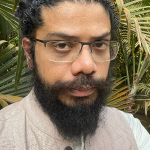Course Information
- 2019-20
- CJP1025
- 5-Year B.A., LL.B. (Hons.)
- V
- Mar 2020
- Seminar Course
This intensive seminar course elective course develops abilities, character, and a sense of direction towards the practice of climate justice. The idea of climate justice is fundamentally predicated on viewing climate change as more than just a scientific concept, and shifts the focus to the philosophical, political, cultural, and contextual dimensions of climate change as refracted through theories and considerations of justice. The course enables learners to develop a ‘climate justice mindset’ and to develop familiarity with some commonly-used approaches, methods, tools and resources to augment the practice of climate justice in varied sectoral/disciplinary/professional contexts. The seminar will be built around specific exercises and experiential components focused on professional practice that responds to some key problems of climate injustice in India. Workshop-style segments will focus on brainstorming, envisioning, strategising, project design, research methodology, team-work, prototyping, documentation, fund-raising, and communication for professional practice relating to climate change.
The initial course module focuses on theoretical approaches to climate justice. The second module locates the boundaries and contours of climate change in the Indian context. Next, an experiential hands-on learning module guides learners in developing familiarity with some commonly used methods, tools and resources to augment the practice of climate justice in varied sectoral/disciplinary/professional contexts. Where applicable, students will be encouraged to practice using such methods and resources in the specific context of their individual projects. The concluding module on transformative approaches for climate justice in India further develops and synthesises the theoretical and practical insights generated earlier in the course through a close engagement with the student projects developed during the course.
The pedagogic approach of this course adopts a mixture of lectures, individualised guidance, peer learning, and learning by doing. In-class and online discussions on specific topics are of high importance as is preparing for each class by familiarising oneself with the background materials. Each class typically involves an initial instructor-led mini-lecture followed by a number of interactive and/or hands-on mini-sessions devoted to analysing, developing and applying relevant theory and background knowledge to well-defined socio- environmental problems/ contexts in India. Images, videos, and multimedia resources are woven into the classes where relevant. Guest lecturers will be invited to take special sessions when possible.
Each student enrolled in the course will be guided and supported in developing an individual project (based on subject/topic interest) focused on climate justice practice. Final projects submitted can take a number of forms (to be decided with the approval of the course instructor), with possible options including: an analytical report, a research paper, a draft journal article, a public information website, a draft legislation, a policy brief, a client brief, a draft petition for a public interest litigation or specialised environmental litigation, a training manual or course curriculum, an environmental justice tool kit, etc. Students will be guided in conceptualising and developing their specific projects and (where possible) will be introduced to external experts suited to provide specific guidance.
No pre-requisites for enrolment and participation in this course apart from an interest in learning about and practising climate justice. Students with a background familiarity in environmental sciences, environmental law and policy, environmental economics, environmental ethics, eco-philosophy, social work, sustainable development, documentary film-making, etc. will be encouraged to develop suitable projects that reinforce and build upon their prior learning.


